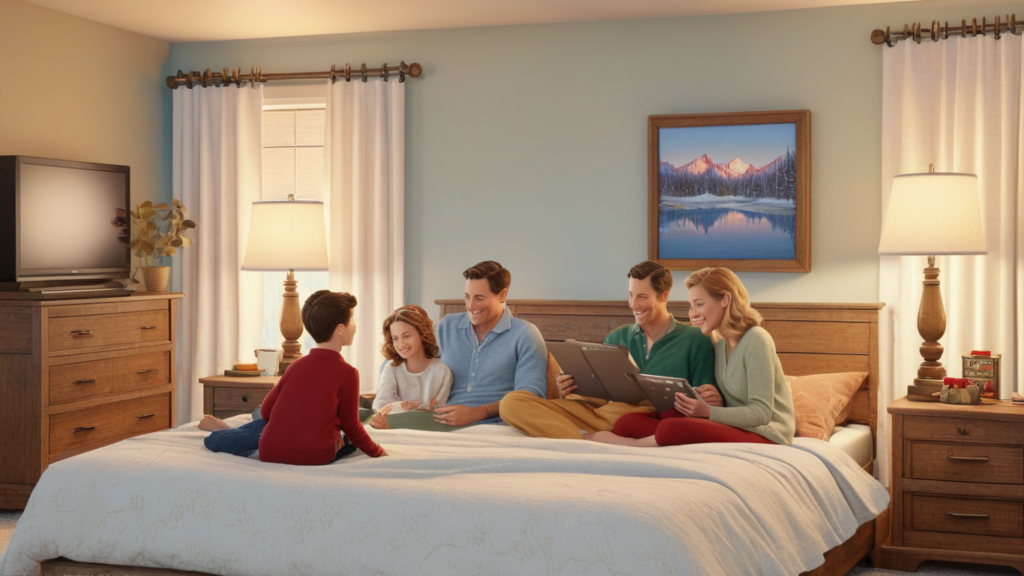We have no bedroom privacy. – The Unseen Intrusion
In the modern era, our bedrooms, once considered sanctuaries of solitude and privacy, are under siege. It’s not a physical invasion, but a digital one, creeping into our lives through our connected devices.
The question of bedroom privacy is no longer confined to prying eyes peering through windows. It’s about the unseen intruders, the digital spies that lurk in our smartphones, tablets, and smart home devices, collecting our most intimate data.
Our bedrooms, the final frontier of personal space, are now battlegrounds in the fight for privacy. This post will delve into the myriad ways our bedroom privacy is being compromised and explore potential solutions to regain control. The journey may be unsettling, but it’s one we must embark on to reclaim our privacy in this interconnected world.

Why is bedroom privacy important?
Bedroom privacy is crucial for a multitude of reasons. The primary one being that it fosters a sense of security and personal space. In a world where we’re constantly connected and monitored, the bedroom often serves as a sanctuary, a place where we can escape from the outside world and enjoy some much-needed solitude.
Another significant aspect of bedroom privacy is the autonomy it provides. It allows individuals to express themselves freely, engage in personal hobbies, or simply relax in their own company. This autonomy is particularly important for adolescents, who are in the process of developing their identities and need a private space to explore their thoughts and feelings without fear of judgement.
Moreover, bedroom privacy also plays a crucial role in maintaining healthy relationships. For couples, it provides a space for intimacy and open communication, which are key components of a strong relationship. For roommates or siblings sharing a room, respecting each other’s privacy can help prevent conflicts and foster mutual respect.
- Security – A private bedroom provides a sense of security and personal space.
- Autonomy – Bedroom privacy allows individuals to express themselves freely and engage in personal activities.
- Relationships – Respecting bedroom privacy can help maintain healthy relationships, whether it’s between couples or roommates.
In the digital age, where privacy is increasingly becoming a luxury, it’s essential to understand and respect the importance of bedroom privacy. It’s not just about having a room to ourselves, but about the freedom, security, and personal growth that comes with it.
How to improve bedroom privacy?
Improving bedroom privacy can be a pressing issue for many, especially in shared living situations. The first step is to invest in quality window treatments. Curtains, blinds, or shutters can effectively block the view from outside, enhancing your privacy.
Another significant aspect is the positioning of your furniture. Rearranging your furniture in a way that obstructs direct view into your private space can significantly enhance your bedroom’s privacy. For instance, placing a tall bookshelf or wardrobe near your window or door can limit visibility.
Soundproofing is another effective measure to consider. While it might not directly relate to visual privacy, it certainly contributes to the overall sense of seclusion. Soundproofing can be achieved by adding insulation to the walls, using noise-cancelling devices, or even just adding thick rugs or carpets that can absorb sound.
Installing a solid door with a lock is another practical way to enhance privacy. While this might seem obvious, many people overlook this simple step. A sturdy door not only provides a physical barrier but also adds a psychological sense of security and privacy.
• Lastly, consider using privacy screens or room dividers. These can be particularly useful in shared bedrooms or studio apartments where separate rooms are not an option. They are affordable, portable, and come in various styles to suit your decor.
Remember, privacy is a fundamental right and creating a private space in your bedroom is crucial for your comfort and peace of mind.
What disrupts bedroom privacy?
One major factor that disrupts bedroom privacy is the lack of physical barriers. This can be due to an open floor plan, shared bedrooms, or even thin walls. It might sound trivial, but the presence of doors, walls, and partitions plays a significant role in maintaining privacy.
The advent of technology has also introduced new threats to bedroom privacy. Smart devices such as phones, tablets, and even smart home devices can unintentionally invade our privacy. For instance, these devices might have apps or features that can track our activities, listen to our conversations, or even watch us through cameras.
Another factor that can disrupt bedroom privacy is the presence of other people. This can include family members, roommates, or even pets. While it’s normal to share spaces with others, it’s also important to set boundaries and respect each other’s privacy.
- Insufficient soundproofing can also impact bedroom privacy. This means that conversations, activities, or even just the sound of moving around can be heard by others. Soundproofing can be a valuable investment to enhance bedroom privacy.
Lastly, the lack of personal boundaries can disrupt bedroom privacy. This can happen when someone enters your room without knocking or when they go through your personal belongings. Establishing and respecting personal boundaries is crucial for maintaining privacy in the bedroom.
In essence, numerous factors can disrupt bedroom privacy. Understanding these factors can help us take steps to enhance our privacy and create a personal sanctuary where we can relax and unwind without worries.
Can lack of privacy affect mental health?
Indeed, lack of privacy, especially in personal spaces like bedrooms, can significantly impact mental health. Privacy is a fundamental human right, crucial for maintaining personal boundaries and fostering individuality. When this right is infringed upon, individuals often feel violated, leading to increased stress levels and anxiety.
In particular, the absence of bedroom privacy can cause severe distress. Bedrooms are personal sanctuaries, spaces where individuals retreat to unwind, reflect, and recharge. When this sanctuary is compromised, it can lead to feelings of vulnerability and discomfort.
• Mental Health Impacts: Lack of privacy can trigger various mental health issues, including depression, anxiety, and post-traumatic stress disorder (PTSD). It can also lead to sleep disorders due to constant fear of intrusion.
Furthermore, the constant fear of being watched or judged can lead to self-consciousness, impacting an individual’s self-esteem and confidence. This constant state of alertness can be mentally exhausting, leading to burnout and other stress-related disorders.
In children and teenagers, lack of privacy can hinder their developmental process. It can affect their ability to form independent thoughts, stifle creativity, and lead to rebellion or aggressive behavior.
Therefore, it’s vital to respect personal boundaries and ensure everyone has their private space, especially in shared living situations. It’s not just about physical comfort, but also about mental wellbeing.
In conclusion, while privacy might seem like a luxury to some, it is, in fact, a necessity for maintaining good mental health.
What are bedroom privacy laws?
Bedroom privacy laws are legal provisions designed to protect your personal space and dignity. They ensure that everyone has the right to enjoy their bedroom without unwarranted intrusion, whether from landlords, family members, or even surveillance devices. These laws are particularly relevant in situations where multiple individuals share a living space, such as in a shared apartment, dormitory, or family home.
The specific laws and regulations can vary significantly from one jurisdiction to another. However, common elements often include provisions against unlawful entry, surveillance, and disturbance. Unlawful entry refers to someone entering your bedroom without your consent or a valid reason. Surveillance involves the use of cameras or other devices to monitor what happens in your bedroom. Disturbance relates to excessive noise or other disruptions that prevent you from enjoying your bedroom in peace.
• Unlawful entry: This is generally considered illegal, unless there is a valid reason, such as an emergency. Landlords, for instance, must typically provide notice before entering a tenant’s bedroom.
• Surveillance: It is typically illegal to install surveillance devices in someone else’s bedroom without their consent. This includes cameras, microphones, and other monitoring devices.
• Disturbance: Excessive noise or other disruptions can infringe on your bedroom privacy. Laws regarding noise levels and times vary, but generally, there are restrictions to prevent disturbances during sleeping hours.
Remember, bedroom privacy is not just a matter of courtesy; it’s a legal right. If you feel that your bedroom privacy is being violated, it’s essential to know your rights and take appropriate action.
How does technology invade bedroom privacy?
In our digital age, the concept of bedroom privacy has been significantly altered. Smart devices, often seen as conveniences, can often become inadvertent spies. For instance, smart TVs and voice-activated devices such as Amazon’s Alexa or Google Home, are always listening, ready to respond to our commands. However, this constant vigilance could lead to potential privacy breaches.
Moreover, the prevalence of smartphones also contributes to this invasion. Many people keep their phones by their bedside, not realizing that apps could be collecting data about their sleep patterns, bedtime habits, and other personal details.
Furthermore, surveillance devices like nanny cams, security cameras, and even baby monitors can be hacked, providing strangers with a direct view into our most private spaces.
- Smart TVs and voice-activated devices: Always listening, these devices can potentially breach our privacy.
- Smartphones: Apps on these devices can collect data about our sleep patterns and personal habits.
- Surveillance devices: Devices like nanny cams and baby monitors can be hacked, providing strangers with a direct view into our private spaces.
In essence, technology has opened up new avenues for privacy invasion. While these devices and platforms offer convenience and connectivity, they also pose significant risks to our bedroom privacy. Therefore, it is crucial to understand these risks and take appropriate measures to protect our privacy.
Is bedroom privacy a human right?
The question of whether bedroom privacy is a human right has become an increasingly significant issue in the era of ubiquitous technology and surveillance. The right to privacy is universally acknowledged as a fundamental human right, with the bedroom often considered the ultimate sanctuary for personal space and tranquility.
Invasions of bedroom privacy can take various forms, such as unlawful surveillance, intrusion by family members, or even digital invasions through smart devices. These intrusions are not only discomforting but can also lead to serious psychological effects, including stress, anxiety, and depression.
• The Universal Declaration of Human Rights (UDHR) does not explicitly mention the right to bedroom privacy. However, it does emphasize the right to privacy in general, which can be interpreted to include the privacy of one’s bedroom. In addition, various international human rights treaties and national constitutions recognize the right to privacy, further supporting the argument that bedroom privacy is indeed a human right.
The violation of bedroom privacy is not merely an invasion of personal space but also a breach of trust and dignity. It is essential to respect and protect this right, not just for the sake of privacy, but also to uphold the values of freedom, autonomy, and respect for personal boundaries.
However, the digital age presents new challenges to bedroom privacy. With the rise of smart homes and internet-connected devices, our bedrooms are no longer immune to invasions of privacy. It is therefore crucial to address these challenges and ensure that our right to bedroom privacy is protected in all circumstances.
How to handle bedroom privacy invasion?
One of the most significant challenges in today’s interconnected world is maintaining bedroom privacy. The sanctity of personal space is often compromised, leading to feelings of discomfort and violation. The first step to tackle this issue is to identify the source of intrusion. It could be a family member, a roommate, or even technology.
Living in shared spaces can sometimes blur the boundaries of privacy. Open communication is key in such situations. Discuss your concerns with the other party and establish ground rules for privacy. If you are dealing with technology intrusion, consider taking steps to secure your digital presence. This can include using privacy screens, setting strong passwords, and regularly updating your security settings.
- Open Communication: Discuss your concerns and establish ground rules.
- Securing Digital Presence: Use privacy screens, strong passwords, and regularly update security settings.
Invasion of bedroom privacy can also occur due to architectural design. In such cases, it is advisable to use curtains, blinds, or room dividers to create a private space. If the invasion is severe and persistent, professional help such as a counselor or a lawyer may be necessary.
Remember, everyone has a right to their own space. It is crucial to respect that right and ensure that our actions do not infringe upon it. In the battle against bedroom privacy invasion, awareness, communication, and proactive measures are your best defenses.
Conclusion: The Importance of Maintaining Bedroom Privacy
In conclusion, the subject of “We have no bedroom privacy” is a significant issue that carries weighty implications for our mental health, human rights, and overall well-being. The importance of bedroom privacy cannot be overstated, it is a sanctuary that provides comfort and peace, away from the world’s prying eyes.
A multitude of factors can disrupt this privacy, ranging from technology invasions to the absence of effective laws. However, various strategies can be implemented to improve bedroom privacy, such as using curtains, locks, and limiting the use of electronic devices.
Lack of privacy can indeed affect mental health, leading to stress, anxiety, and other psychological issues. Therefore, it’s essential to address any invasion promptly and effectively. The laws surrounding bedroom privacy vary widely, but the consensus is that it is a basic human right.
The advent of technology has both positive and negative impacts on bedroom privacy. While it has made our lives more convenient, it has also opened up new avenues for privacy invasion. It’s crucial to stay updated with future developments and trends that may further impact our bedroom privacy.
In the end, bedroom privacy is a fundamental aspect of our lives that needs to be respected and protected. It is a right, not a privilege, and it’s up to us to ensure it remains so.





